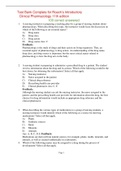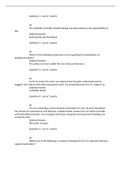Test Bank Complete for Roach’s Introductory
Clinical Pharmacology 11th edition
100 correct answered
1. A nursing instructor is preparing a teaching plan for a group of nursing students about
pharmacology. When describing this topic, the instructor would focus the discussion on
which of the following as an essential aspect?
A) Drug name
B) Drug class
C) Drug action
D) Drug source Ans: C
Feedback:
Pharmacology is the study of drugs and their action on living organisms. Thus, an
essential aspect of pharmacology is drug action. An understanding of the drug name,
drug class, and drug source is important, but the most critical aspect related to
pharmacology is how the drug acts in the body.
2. A nursing student is preparing to administer a prescribed drug to a patient. The student
reviews information about the drug and its actions. Which of the following would be the
best choice for obtaining this information? Select all that apply.
A) Nursing instructor
B) Nurse assigned to the patient
C) Clinical drug reference
D) Prescribing health care provider
E) Clinical pharmacist Ans: C, E
Feedback:
Although the nursing student can ask the nursing instructor, the nurse assigned to the
patient, and the prescribing health care provider for information about the drug, the best
choices for drug information would include an appropriate drug reference and the
clinical pharmacist.
3. When describing the various types of medications to a group of nursing students, a
nursing instructor would identify which of the following as a source for deriving
medications? Select all that apply.
A) Plants
B) Synthetic sources
C) Mold
D) Minerals
E) Animals
Ans: A, B, C, D, E Feedback:
Medications are derived from natural sources, for example, plants, molds, minerals, and
animals, as well as created synthetically in a laboratory.
4. Which of the following names may be assigned to a drug during the process of
development? Select all that apply.
Page 1
,Test Bank Complete for Roach’s Introductory
Clinical Pharmacology 11th edition
100 correct answered
A) Chemical name
B) Official name
C) Pharmacologic name
D) Trade name
E) Nonproprietary name Ans: A, B, D, E Feedback:
Throughout the process of development, drugs may have several names assigned to
them including a chemical name, a generic (nonproprietary) name, an official name, and
a trade or brand name.
5. A drug may be classified by which of the following? Select all that apply.
A) The chemical type of the drug's active ingredient
B) The way the drug is used to treat a specific condition
C) The generic name of the drug
D) The trade name of the drug
E) The nonproprietary name of the drug Ans: A, B
Feedback:
A drug may be classified by the chemical type of the active ingredient or by the way it
is used to treat a particular condition. Generic, trade, and nonproprietary refer to how a
drug is named.
6. A group of nursing students are reviewing information about the process of drug
development in the United States. The students demonstrate understanding of this
process when they identify that which of the following categories are assigned by the
Food and Drug Administration to newly approved drugs? Select all that apply.
A) Metabolite
B) Noncontrolled substance
C) Prescription
D) Nonprescription
E) Controlled substance Ans: C, D, E Feedback:
Once drugs are approved for use, the FDA assigns the drug to one of the following
categories: prescription, nonprescription, or controlled substance. Metabolite refers to
the inactive form of the drug. Noncontrolled substance is a term that is not used.
7. Which of the following would be most important for the nurse to do to ensure the safe
use of prescription drugs in the institutional setting? Select all that apply.
A) Administering drugs
B) Monitoring clients for drug effects
C) Prescribing drugs
D) Evaluating clients for toxic effects
E) Educating clients/caregivers about drugs Ans: A, B, D, E Feedback:
Page 2
,Test Bank Complete for Roach’s Introductory
Clinical Pharmacology 11th edition
100 correct answered
In the institutional setting, the nurse's role to ensure safe use of prescription drugs
includes administering drugs, monitoring drug effects, evaluating for toxic effects, and
educating clients and caregivers about drugs.
8. The nurse is helping a client review a prescription from the health care provider. When
examining the prescription, which of the following would the nurse expect to find
documented? Select all that apply.
A) Name of the drug
B) Dosage of the drug
C) Route of drug administration
D) Times of drug administration
E) Licensed prescriber's signature Ans: A, B, C, D, E Feedback:
The prescription must contain the client's name, the name of the drug, the dosage, the
method and times of administration, and the signature of the licensed health care
provider prescribing the drug.
9. After teaching a group of nursing students about nonprescription drugs, the nursing
instructor determines that the teaching was successful when the students identify which
of the following? Select all that apply.
A) They require a licensed health care provider's signature.
B) They are referred to as over-the-counter drugs.
C) They can be taken without risk to the client.
D) They have certain labeling requirements.
E) They should be taken only as directed on the label. Ans: B, D, E Feedback:
Nonprescription drugs are often referred to as over-the-counter (OTC) drugs. They do
not require a prescription (a licensed health care provider's signature) but do not come
without risk to the client. The federal government has imposed labeling requirements of
OTC drugs and they should only be taken as directed on the label unless under the
supervision of a health care provider.
10. A nursing student is reviewing information about the Controlled Substances Act of
1970. The student would expect to find which of the following as being regulated for
drugs classified as controlled substances? Select all that apply.
A) Manufacturing
B) Elimination
C) Distribution
D) Formulation
E) Dispensing Ans: A, C, E Feedback:
The Controlled Substances Act of 1970 regulates the manufacture, distribution, and
dispensing of drugs classified as controlled substances. Elimination refers to the
Page 3
, Test Bank Complete for Roach’s Introductory
Clinical Pharmacology 11th edition
100 correct answered
excretion of drugs from the body, a pharmacokinetic activity. The act does not address
formulation of the drug.
11. When reviewing information about the Orphan Drug Program, which of the following
would the nurse expect to find? Select all that apply.
A) The program encourages the development and marketing of products to treat rare
diseases.
B) The program grants provisional approval with a written commitment from the
drug company to formally demonstrate client benefits.
C) The program provides for incentives, such as research grants, protocol assistance,
and special tax credits, to develop products to treat rare diseases.
D) The program grants 7 years of exclusive marketing rights to the manufacturer if
approved.
E) The program accelerates approval of drugs based on preliminary evidence before
formal demonstration of client benefits. Ans: A, C, D Feedback:
The Orphan Drug Program encourages the development and marketing of products used
to treat rare diseases. The program provides incentives to encourage manufacturers to
develop orphan drugs, and if approved, the manufacturer has 7 years of exclusive
marketing rights. Accelerated programs involve provisional approval and approval
based on preliminary evidence.
12. After teaching a group of nursing students about pharmacokinetics, the instructor
determines that the teaching was successful when the students identify which of the
following as a phase? Select all that apply.
A) Absorption
B) Distribution
C) Administration
D) Metabolism
E) Excretion Ans: A, B, D, E Feedback:
The pharmacokinetic phases are absorption, distribution, metabolism, and excretion.
The acronym ADME is a helpful way to remember the pharmacokinetic phases.
13. A nurse is preparing a teaching plan for a client who is prescribed an oral medication.
As part of the plan, the nurse expects to describe the importance of absorption. The
nurse would integrate knowledge of which of the following as a mechanism for
absorption in the gastrointestinal tract? Select all that apply.
A) Active transport
B) Transposition
C) Passive transport
D) Endocytosis
Page 4





